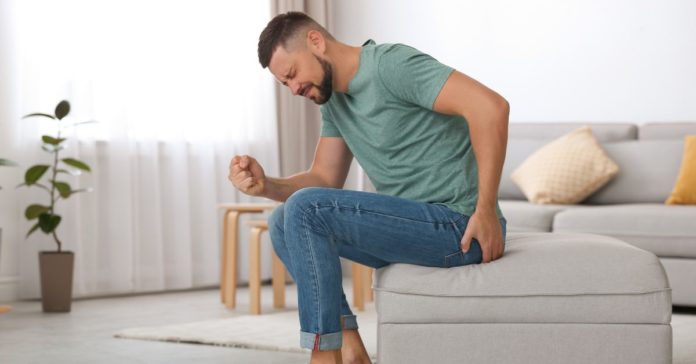Hemorrhoids (also known as piles) are bulging veins that resemble varicose veins in the anus and lower rectum. Internal hemorrhoids form inside the rectum, while external hemorrhoids form beneath the skin around the anus. Three out of every four individuals will experience hemorrhoids at some point in their lives.
Hemorrhoids can be successfully treated using a variety of techniques. Many people get relief by employing natural therapies and making lifestyle changes.
What causes external hemorrhoids?
The most common cause of external hemorrhoids include excessive straining during bowel movements. External hemorrhoids are caused external dilated or enlarged veins in the rectum or anus. Hemorrhoids on the outside of the anus are frequently seen beneath the skin that surrounds it.
Also Read About: Solitary Rectal Ulcer Syndrome
Other causes and risk factors for hemorrhoids, apart from straining include:
- Lifting large/heavy objects
- Obesity
- Consuming low-fiber diet
- Long periods of standing or sitting
- Pregnancy
- Ascites (a fluid buildup that puts extra strain on the stomach and intestines)
What are the symptoms of external hemorrhoids?
External hemorrhoids are itchy and uncomfortable.
People frequently feel them when they touch the area around the anus. External hemorrhoids are frequently a shade or two darker than the surrounding skin color.
A patient with hemorrhoids may experience a variety of symptoms. The degree of the hemorrhoids will influence the symptoms. The following are some of the symptoms the patient may be experiencing:
- Pain and Itching in the anus area or rectal area
- Bumps on or around the anus
- Blood in stool
- Blood detected on toilet paper or in the toilet.
- Bloated bumps around the anus
What are the treatments for external hemorrhoids?
Depending on the severity of the illness, hemorrhoids can be treated in several ways.
The doctor may also recommend cold packs to relieve swelling, suppositories, or hemorrhoid creams as general treatments.
Individuals with a less severe case of hemorrhoids may benefit from these choices. If the condition is more serious, the doctor may recommend surgery.
Medications and Home Remedies
Home remedies can often reduce minor pain, swelling, and irritation caused by hemorrhoids.
- Consume foods that are high in fiber– Increase the consumption of fruits, veggies, and whole grains. These foods softens the stool and increases its bulk, which in turn help the patient avoid straining, which can aggravate hemorrhoids symptoms. To avoid gas problems, gradually increase the fiber intake.
- Use topical therapies such as over-the-counter hemorrhoid medication or suppository, ice packs
- Soak in a warm bath or sitz bath regularly – Two to three times a day, soak the anal area in plain warm water for 10 to 15 minutes. The sitz bath is designed in a way and for convenience of the patient. It fits over the toilet
- Take pain reliever (oral) – Temporarily ease the discomfort using acetaminophen or ibuprofen
- Hemorrhoid symptoms usually disappear within a week after receiving these therapies. If the patient does not get relief after a week or has significant pain or bleeding, you should consult a doctor immediately
Medication
The doctor may prescribe over-the-counter creams, ointments, suppositories, or pads if the hemorrhoids are only causing minor discomfort. These medicines contain ingredients including witch hazel, hydrocortisone, and lidocaine, which reduces pain and discomfort briefly.
Patients are also advised to not use an over-the-counter steroid cream for more than a week, unless the doctor says so , as it can weaken the skin.
External thrombectomy for hemorrhoids
A doctor can remove an external hemorrhoid if it has produced a painful blood clot (thrombosis), which can provide immediate relief. This procedure is most effective and is conducted under local anesthesia, within 72 hours of the clot developing.
Minimally invasive treatments
The doctor may consider one of the various minimally invasive procedures for persistent bleeding or severe hemorrhoids.
- Rubber band ligation – It is a technique that involves tying a rubber band around the hemorrhoids to stop internal hemorrhoids from bleeding. The doctor wraps one or two thin rubber bands around its base. Hemorrhoids will wither and fall of within a week.
- Injectables (Sclerotherapy) – The doctor injects the haemorrhoid tissue with a chemical solution to shrink the hemorrhoid tissue. Injections are painless but they are less effective than rubber band litigation.
- Coagulation (infrared, laser, or bipolar) – Coagulation treatments use laser or infrared light and heat. They tighten and shrivel microscopic internal hemorrhoids that are bleeding.
Surgical procedures
If other treatments haven’t worked or if the patient has huge hemorrhoids, the doctor may suggest one of the following:
- Hemorrhoidectomy– Extra tissue that causes bleeding is removed in one of several methods by the surgeon. The procedure can be done under local anesthetic with sedation, spinal anesthesia, or general anesthesia. Hemorrhoidectomy is the most effective and thorough treatment for severe or recurring hemorrhoids. The majority of patients feel some discomfort after surgery, which can be managed with medicines..
- Stapling– Stapled hemorrhoidopexy is a technique that stops blood flow to hemorrhoidal tissue. Stapling is a less painful alternative to hemorrhoidectomy and allows for a faster return to normal activities. Stapling has been related to a higher rate of recurrence and rectal prolapse, in which a piece of the rectum protrudes from the anus, when compared to hemorrhoidectomy. Consult the doctor about the best course of action.


















